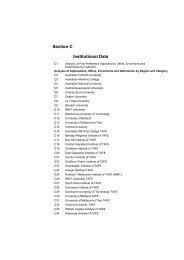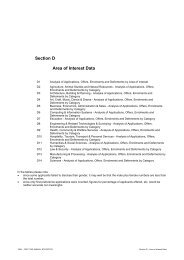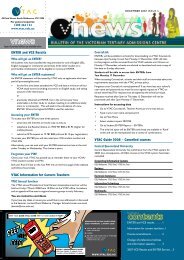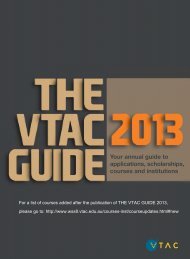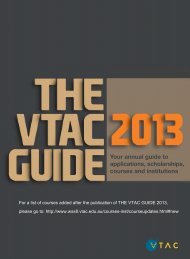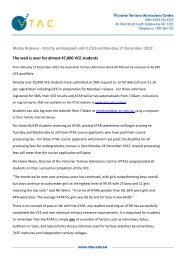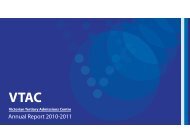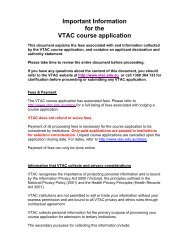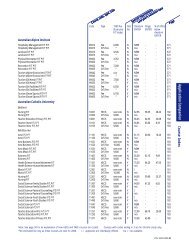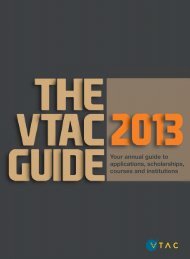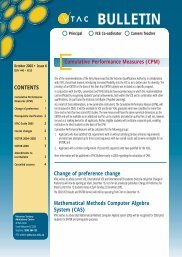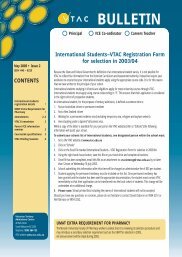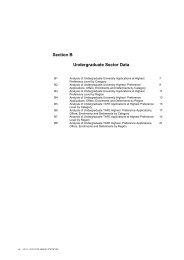VICTER 2015: Victorian Tertiary Entrance Requirements - VTAC
VICTER 2015: Victorian Tertiary Entrance Requirements - VTAC
VICTER 2015: Victorian Tertiary Entrance Requirements - VTAC
Create successful ePaper yourself
Turn your PDF publications into a flip-book with our unique Google optimized e-Paper software.
Types of institutions & courses to get you started...<br />
Higher education<br />
Courses<br />
Length<br />
Higher education courses provide professional qualifications with an emphasis on theory and the development of<br />
transferable skills. Some courses are vocational, leading to careers in clearly identified areas (e.g. Accounting) while<br />
others are ‘generalist’ with no particular vocational skills component. Although courses vary, many higher education<br />
courses include formal lectures and tutorials.<br />
The majority of higher education courses with applications through <strong>VTAC</strong> are bachelor degrees and a few associate<br />
degrees. A basic undergraduate degree usually requires a minimum of three to four years full-time study. Many<br />
courses such as combined degrees and industry-based learning (work experience degrees are longer). For further<br />
information about Higher education courses through <strong>VTAC</strong> see CourseSearch on the <strong>VTAC</strong> website.<br />
Vocational Education Training (VET) courses<br />
Courses<br />
Length<br />
VET courses provide professional and para-professional qualifications with an emphasis on practical skills and<br />
vocational pathways that lead into higher level training, higher education or employment. A wide variety of study areas<br />
are offered; each one involving training for expertise in a particular skill area. VET qualifications are designed for close<br />
consultation with industry to ensure the training is current and relevant for industry requirements. Class sizes are<br />
usually small allowing for individual attention. These courses may be work based or involve a work placement. VET<br />
courses available through <strong>VTAC</strong> or directly include certificate II, certificate III, certificate IV, diplomas and advanced<br />
diplomas.<br />
Diplomas and advanced diplomas are normally equivalent to two years full-time study. Some courses offer one year<br />
accelerated programs. Refer to the individual course entries in the <strong>VTAC</strong> Guide 2013, under title and length, for<br />
specific details. Certificate IV can be (but are not always) equivalent to one year full-time study. For general VET course<br />
enquiries telephone 131 823.<br />
Teaching styles<br />
University<br />
TAFE<br />
Independent<br />
<strong>Tertiary</strong> Colleges<br />
University teaching styles vary, however they generally include formal lectures, tutorials, seminars, practical<br />
workshops and/or laboratory classes and work experience placements.<br />
TAFE teaching styles involve small classes, individual attention and diverse programs. They are devised to ensure that<br />
they are highly accessible, provide a range of pathways and ensure practical learning while bridging the gap between<br />
work and education.<br />
Independent tertiary colleges offer a diverse range of teaching styles including lectures, workshops, laboratory<br />
classes, seminars, small group tutorials, practical work placements, industry visits and self-paced virtual classrooms.<br />
Courses may lead to employment or further study at degree or postgraduate level. A number of these courses offer<br />
credit transfer or arrangements with other institutions.<br />
Types of institutions & courses to get you started...<br />
9




